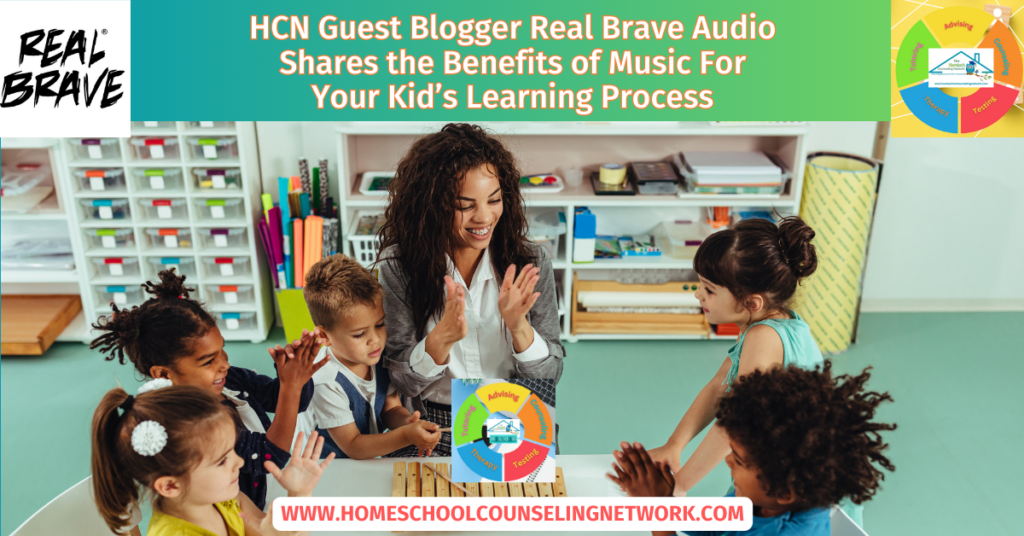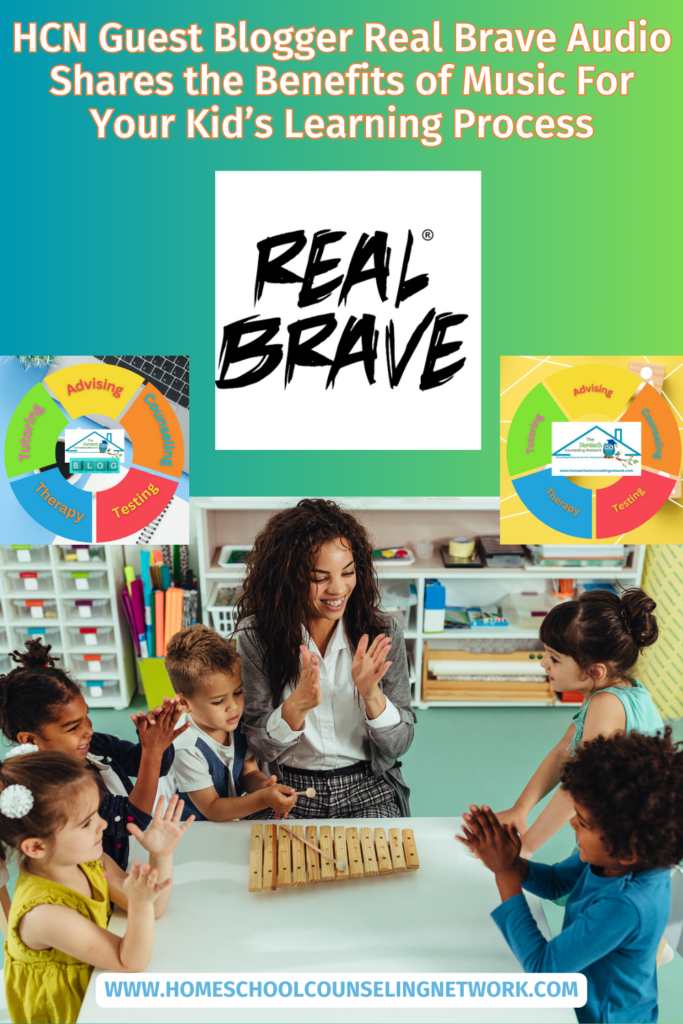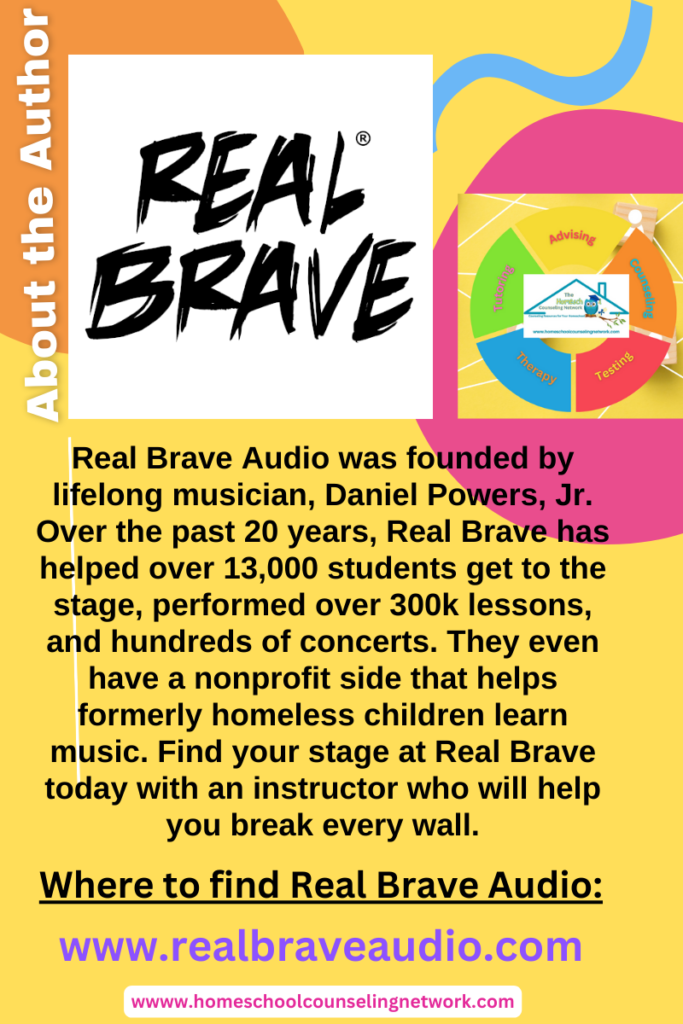HCN Guest Blogger Real Brave Audio Shares the Benefits of Music For Your Kid’s Learning Process

Music, often considered the universal language of emotions, plays a significant role in various aspects of our lives, influencing our mood, creativity, and even our social interactions. However, one of the most fascinating areas where music profoundly impacts is in the realm of learning and cognitive development.
The intersection of music and learning is a rich field of study, revealing that integrating music into our learning processes can enhance memory, improve concentration, and foster a more engaging and effective learning environment. As proof of this, if you go to YouTube now and you search for background music, you will find tons of music videos for concentration, studying, focus and even to calm your stress and induce sleep.
That is why, in this blog, we’ll explore the myriad benefits of music for learning skills, shedding light on how melodies and rhythms can be more than just a source of entertainment but a powerful tool for educational enrichment.
1. Enhancement of Memory and Recall
One of the most significant benefits of music in the learning process is its ability to enhance memory and recall because it stimulates key brain areas involved in memory processing, such as the hippocampus, prefrontal cortex, and temporal lobe. Studies have shown that music, especially songs with lyrics, can be an effective mnemonic device, helping learners remember information more efficiently.
The emotional resonance of music further strengthens memory formation, as emotionally charged experiences are often more memorable. This is why many of us can easily recall the lyrics to our favorite songs or why children’s educational content often includes musical elements. The rhythm and melody create a pattern that our brain can latch onto, making it easier to retrieve information associated with the music later on.
The symbiotic relationship between music and memory not only makes learning more engaging but also transforms memorization into an effective and enjoyable strategy, highlighting the vast potential of music in enhancing learning experiences.
2. Increased Concentration and Focus
Music also boosts concentration and focus because is linked to its influence on the brain’s pathways for attention and sensory processing. Instrumental and classical music, in particular, can foster a state of relaxed alertness, minimizing distractions and facilitating deep immersion in tasks—a phenomenon often described as a “flow” state. The concept of the “Mozart Effect,” though initially overstated, underscores the idea that certain musical characteristics can align with brainwave patterns to enhance cognitive function during specific tasks. By reducing cognitive load, music allows the brain to allocate more resources to the task at hand, especially when it lacks lyrics, thereby avoiding the added burden of verbal processing.
The effectiveness of music in enhancing focus varies among individuals, influenced by personal preferences and the nature of the task. Thus, integrating music into study or work environments involves personal experimentation to discover the most beneficial musical styles and genres. This tailored approach ensures that the chosen music supports concentration without becoming a distraction, highlighting the importance of individual differences in optimizing the use of music for improved focus and productivity in learning and professional settings.
3. Stress Reduction and Improved Mental Health
Another ability of music is to alleviate stress and enhance mental health because it plays a significant role in creating optimal learning environments, making it a vital component of educational well-being. Its capacity to modulate emotional responses, lower stress hormones like cortisol, and trigger the release of dopamine transforms the learning atmosphere into one that is more conducive to cognitive engagement. This stress-reducing effect not only bolsters mental health but also directly impacts learners’ ability to concentrate, retain information, and approach problem-solving with enhanced clarity.
Integrating music as a background element during study sessions can further amplify this positive impact, provided the music chosen is calming and aligns with the individual’s tastes. Such a personalized approach to incorporating music into learning routines not only diminishes stress but also cultivates a sense of enjoyment and emotional resilience, crucial for navigating the often high-pressure environment of academic pursuits. Ultimately, the strategic use of music in educational contexts underscores its capacity to foster a more nurturing, focused, and emotionally balanced learning experience.
4. Fostering Creativity and Problem-Solving
Music has a potent influence on creativity and problem-solving lies in its ability to activate the brain’s creative centers and evoke a broad spectrum of emotional states, thereby fostering divergent thinking and innovative solutions. By engaging areas of the brain associated with creativity, music encourages individuals to explore a multitude of possibilities, thereby enhancing problem-solving skills across various disciplines. The right kind of background music, particularly instrumental pieces with moderate tempos, can provide a stimulating backdrop that enhances cognitive performance without causing distractions, making it particularly beneficial for tasks requiring sustained attention and creative input.
Moreover, the emotional modulation provided by music can lead to an expansive mindset, conducive to generating novel ideas and approaches. This dynamic interplay between music, creativity, and emotional well-being underscores the cross-disciplinary benefits of incorporating music into problem-solving contexts, making it a valuable tool for enhancing innovative thinking in both educational and professional environments.
5. Improving Motivation and Engagement
Music can significantly enhance motivation and engagement in the learning process. Its motivational qualities not only uplift students’ spirits, making challenging tasks seem more manageable but also transform the learning experience into a dynamic and immersive process. By integrating music into educational content or using it as a background element, educators can significantly boost students’ interest and interaction with the material. Furthermore, music facilitates active learning through creative activities, such as composing songs related to the study material, thereby deepening students’ connection to the content and promoting collaborative learning.
The ambiance created by a well-chosen musical backdrop can also contribute to a more conducive and less stressful learning atmosphere, encouraging longer and more focused study sessions. Tailoring musical selections to reflect the diverse tastes and cultural backgrounds of students can further personalize and enrich the learning experience, making it more inclusive and resonant with students’ identities. Ultimately, the strategic use of music within educational contexts serves to not only make learning more enjoyable but also to enhance the overall effectiveness and depth of educational engagement.
6. Cultural Awareness and Empathy
Music serves as a powerful catalyst for fostering cultural awareness and empathy within educational settings, acting as a bridge to understanding diverse global traditions and values. By integrating a variety of musical styles and traditions into the curriculum, educators can offer students immersive experiences of different cultures, enhancing their global perspective and sensitivity to cultural nuances. This exposure not only broadens students’ worldviews but also deepens their emotional intelligence, allowing them to connect more profoundly with the emotional expressions embedded in different musical traditions.
Furthermore, music encourages collaborative learning, uniting students in creative endeavors that promote teamwork and a sense of shared humanity. It also serves as a medium for exploring social and environmental issues, thereby enhancing social awareness and critical thinking about the role of art in societal change. Through engagement with music from diverse cultures, students undergo personal growth, exploring and shaping their identities in a global context. Ultimately, the use of music in education enriches the learning experience, equipping students with the empathy and understanding necessary for thriving in a multicultural world.
The integration of music into educational settings offers a myriad of benefits, from enhancing memory and concentration to fostering creativity and emotional well-being. As we explore the intricate relationship between music and learning, it becomes evident that music is not just an art form but a vital educational tool that can enrich the learning experience in profound ways. Whether it’s through listening to background music while studying, using songs as mnemonic devices, or integrating musical activities into lessons, the harmonious blend of music and education has the potential to transform the way we learn, teach, and perceive the world around us.

Who Is Real Brave Audio?

Author: Daniel Powers Jr, the founder of Real Brave™, serves as the chief inspiration to thousands of students in the Real Brave music instruction program. He’s also the visionary behind PracticePad™, an online platform for live one-on-one online music lessons, lesson tracking, and scheduling. Beyond his entrepreneurial pursuits, Daniel leads a non-profit organization that provides formerly homeless children with access to music education, making a profound impact on their lives. His unwavering dedication to music, innovation, and education continues to inspire individuals to reach their fullest potential while creating positive change in communities. Follow Real Brave on all the socials:
youtube.com/@realbraveinc
twitter.com/realbraveinc
instagram.com/realbraveaudio
facebook.com/realbraveinc
Want To Write For Us?
Learn more about how you can become a guest blogger for The Homeschool Counseling Network here.

Let’s Keep In Touch
Be sure you do not miss a blog post by signing up for our newsletter or joining our Facebook group.
Blessings,
Kimberly Bennett, LPC
Founder/CEO The Homeschool Counseling Network Inc.

This website is not a professional counseling website and nothing here should be construed as professional counseling advice. Although Kimberly Bennett, LPC is a Licensed Professional Counselor, she is not your counselor, and no counselor-client relationship is established unless she has signed an agreement with you. All information provided through this website is for informational and educational purposes only.